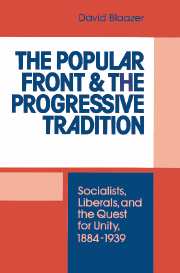 The Popular Front and the Progressive Tradition
The Popular Front and the Progressive Tradition Book contents
- Frontmatter
- Contents
- Preface
- Acknowledgements
- Abbreviations
- Notes on the text
- Introduction
- 1 The progressive side of politics
- 2 The colours of the rainbow
- 3 Imperialism and war
- 4 The pilgrims' progress
- 5 Inside the left
- 6 Fascism, unity, and loyalty: 1932–1937
- 7 The Popular Front
- Conclusion
- Notes
- Bibliography
- Index
6 - Fascism, unity, and loyalty: 1932–1937
Published online by Cambridge University Press: 24 September 2009
- Frontmatter
- Contents
- Preface
- Acknowledgements
- Abbreviations
- Notes on the text
- Introduction
- 1 The progressive side of politics
- 2 The colours of the rainbow
- 3 Imperialism and war
- 4 The pilgrims' progress
- 5 Inside the left
- 6 Fascism, unity, and loyalty: 1932–1937
- 7 The Popular Front
- Conclusion
- Notes
- Bibliography
- Index
Summary
The 1932 Conway Memorial Lecture, with which the previous chapter began and ended, fell neatly between two much more momentous events which upset the precarious balance of which Brailsford spoke: the formation of the ‘National Government’ in August 1931, and Hitler's accession to the Chancellorship of Germany in January 1933. It is only in the context of these two events that the Labour left's support for the United Front can be understood, for between them they served to strengthen every argument that leftists had ever put for uncompromising socialist solutions, while seriously undermining their belief that any such solutions could be found via the institutions of British democracy. Ramsay MacDonald and Adolf Hitler make an odd couple, but the British left tended to see their actions as proof of the same truth: capitalism and democracy were radically incompatible, and only by the swift destruction of capitalism, or at the very least of large-scale capitalism, could democracy be achieved. In this context co-operation with Liberals, who, no matter how well intentioned, continued to support both capitalism and the orderly processes of parliamentary democracy, could have no place. This point is vital to our understanding of the United Front, which, it will be remembered, was intended in part as an anti-Liberal tactic. The Labour left, by proposing unity between the Labour Party, the ILP, and the Communists hoped thereby to place continuing pressure on those in the Labour leadership whom they suspected of seeking an understanding with the Liberal Party.
- Type
- Chapter
- Information
- The Popular Front and the Progressive TraditionSocialists, Liberals and the Quest for Unity, 1884–1939, pp. 147 - 172Publisher: Cambridge University PressPrint publication year: 1992


